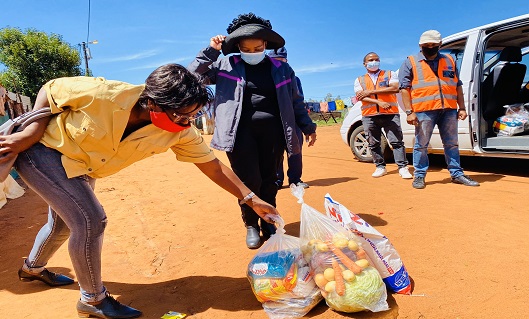Office of the Premier 2022/05/22 - 22:00

Thembisa Shologu
The Gauteng Department of Agriculture, Environment, and Rural Development (GDARD) will expand its food security programs to reach 78 144 food-insecure households by 2024.
This will be done through the implementation of household, community, school, and church gardens across the Gauteng City-Region which are geared to end hunger and malnutrition by 2030.
Issues of household food and nutrition security have received increasing attention recently as residents navigate the impact of COVID-19, climate change, rising food prices, and tough economic conditions.
According to StatsSA, about 15% of Gauteng's population faces food insecurity, and 7.3% suffer from severe inadequate access to food.
"We will improve local food production through the creation of a solidarity economy for urban food systems. In this regard, 10 000 urban farms will be developed and handed over to previously disadvantaged beneficiaries with the associated technical support to ensure long-term sustainability," said MEC Parks Tau during the tabling of the GDARD budget.
About 52% of the R3,1 billion budget over the 2022 Medium Term Expenditure is dedicated towards the compensation of employees. This includes funding of the wage bill, cost of living adjustment, and anticipated public sector wage agreement for 2022. About 44% has been allocated for goods and services, 1% towards transfers and subsidies, and 3% allocated to the procurement of capital assets.
"The outer year budget allocation (2023/24 and 2024/25) increases by 1,5% and 3% respectively which translates to a nominal increase of R15 million and R33.7 million in the respective years.
"For the 2022/23 financial year, the budget amounts to R1,044 560 billion. The budget is costed and aligned to the 2022/23 Departmental Annual Performance Plan," said Tau.
Furthermore, the department has committed itself to collect an amount of R47,6 million over the 2022 Medium-Term Expenditure Framework (MTEF) cycle.
About 73% of the revenue will be collected through the sale of goods and services, 25% from fines, penalties, and forfeits and 8% from financial transactions in assets and liabilities.
In support of the agro-processing enterprises, the department has focused its support on the five value chains of beef, grains, poultry, vegetables, and piggery to ensure access to markets as well as access to finance.
In the red meat value chain, GDARD provided two red meat mobile abattoirs to two enterprises, Sizalo Bonsmara and Eve's Eden Farm. These entities are expected to generate a combined gross income of R3.5 million in 6 months.
The provision of poultry mobile abattoirs has assisted eight black poultry enterprises in generating collectively an income of R4.4 million.
RELATED NEWS
No related news

